Letter from the Chair
Dear Friends,
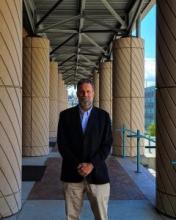
After two successive years of “Extraordinary Circumstances” it has been particularly welcome to be back on campus this Spring. I took the opportunity to make visits to the quad to enjoy the cherry blossoms, and Spring sunshine. It’s amazing to be able to take in the beauty. It is also great to see more people around the department, and as chair, it was wonderful to be able to sponsor events to encourage people to get back together. I’d like to thank everyone who has donated to the Friends of Astronomy account, which has enabled these events to happen. Speaking of gifts, I want to thank all who participated in Husky Giving day on April 7th. Thanks to your generosity, we now have several scholarships for undergraduates to work on research this summer.
Another in-person activity I’m looking forward to this year will be our upcoming graduation ceremony. For the past two years we have had our ceremony online. While these have been amazing events, thanks to the hard work and creativity of our staff and faculty, I have missed congratulating our accomplished students in person. It will be wonderful to do so again on Friday, June 10, 2022 at 11:45am in the Physics/Astronomy Auditorium.
For the next few months we will be working on our Graduate Program review. Every 10 years we are asked to review our progress in instruction, research and public service and consider future objectives in these areas. We were to start this process two years ago, but a global pandemic threw a wrench into the works. In the meantime, however, the National Academies of Sciences, Engineering and Medicine published the “Astro2020” report, identifying scientific priorities and opportunities in astronomy and astrophysics for the next decade. It is exciting to be thinking about how our department will take advantage of these opportunities and participate in programs from identifying and characterizing Earth-like planets outside our Solar System to understanding the origins and evolution of galaxies. There are great discoveries to be made, and we look forward to sharing them with you.
Last but not least, please follow our department’s Instagram page! We post about upcoming departmental events, student/faculty spotlights and more.
With warm wishes,
Thomas Quinn
Professor and Chair
Astronomy Department
University of Washington
Kudos of the Quarter: Daniel Piacitelli
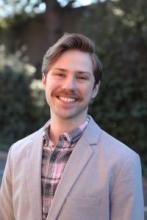
The Astronomy Department would like to introduce you to Daniel Piacitelli. Daniel has been an extraordinary student, researcher, and leader in outreach while at UW. For the last four years, Daniel has been researching the massive reservoir of diffuse gas surrounding galaxies, called the circumgalactic medium (CGM). The CGM is understood to have great implications on the evolution and star formation of the central galaxy as it governs the galaxy’s accretion of additional matter. Due to the CGM being so diffuse, the bulk of research surrounding it has been in absorption spectroscopy and Daniel’s most recent project, with Professor Matt McQuinn, aimed to analytically predict the emission from the CGM in optical and ultraviolet spectral lines. He co-led a study that was recently submitted to Monthly Notices of the Royal Astronomical Society on emission from the circumgalactic medium. This study surveys various emission lines, identifying the most promising, which should guide future observational efforts. Daniel’s work resulted in simple formulae for predicting emission in various lines that will aid other researchers.
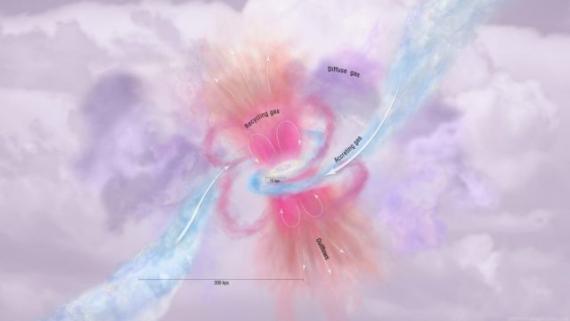
“In addition to his research excellence, Daniel has received substantial recognition at the University. He received the Mary Gates Fellowship to work on undergraduate research. He received the Department’s Baer Prize for excellence in research, academics, or public outreach.” —Professor Matt McQuinn
Outside of research, Daniel works with the UW RSO SynBio, which aims to draft inclusive and accessible STEM education materials for everyone. Outside of UW, Daniel enjoys hiking, baking, and reading science fiction and fantasy novels. Daniel also is optimistically hoping to pick up crochet. Please join us in celebrating all of Daniel’s amazing accomplishments, and wishing him well in crocheting!
GCAP
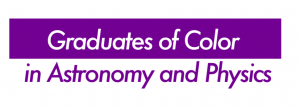
The Graduates of Color in Astronomy and Physics (GCAP) is a registered student organization at the UW that aims to build community and provide a more safe, productive, and supportive environment for graduate students of color in Astronomy and Physics to discuss their experiences. In this past year, we have been virtually hosting our bi-weekly lunch, Chill Lunch, to connect with and support one another.
Last year, we focused on sustaining our mental health with the onset of COVID. Now that healing has been taking place, a lot of us wondered about how to move forward in our careers within this new reality. We partnered with the National Astronomy Consortium (NAC) at the National Radio Astronomy Observatory to once again host our quarterly speaker series, with this year’s theme focusing on navigating academia as POC graduate students. We already invited Nick Daily (he/they) from LuvServedDaily Consulting to speak with us about navigating politics and racism in STEM careers and are looking forward to our upcoming workshop with Dr. Christopher Moore from the Smithsonian Center for Astrophysics on utilizing support systems to succeed in our Ph.D. programs and beyond.
We were also happy to welcome prospective students this year. We moderated the BIPOC Community Hour during the Astronomy Department Prospective Visit where prospective students of color had the opportunity to ask questions about current grad students’ experiences at the UW. We are looking forward to our first in-person volunteering event with the Conscious Eatery and celebrating the many accomplishments of GCAP members with an outdoor potluck at the end of the year. This includes celebrating our 2022 Ph.D. graduates, Nicole Sanchez, Akaxia Cruz, and Zeeshawn Kazi. They have made GCAP an even more wonderful group, and we’ll miss them greatly. Congratulations to you all!
If you would like to help support our community, we would welcome any gifts to the GCAP support fund. These funds are used to build community through hosting events, bringing in speakers, and purchasing supplies.
Faculty Spotlight: Jessica Werk
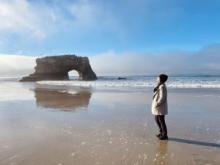
We have the great privilege of sharing a Q&A answered by Professor Jessica Werk. Professor Werk joined the department in 2016, and has been a rocket of inspiration ever since. She recently won a prestigious CAREER award, and was promoted to Associate Professor. In addition, we are proud to share that Professors Werk, Tuttle, and Levesque were featured in a Scientific American article titled “Women Are Creating a New Culture for Astronomy.” Please sit back and enjoy this dive into the magic that is Professor Werk.
Q: How did you end up in the astronomy department? What made you want to study/major in this field?
When I was a freshman at Wesleyan University — a small liberal arts university in Connecticut — I didn’t really know what major I wanted to pursue. I was considering international politics, economics, and archeology, but not astronomy! My roommate suggested we take an Intro to Astronomy course together. I said “why not?” and so that’s how I found myself in ASTR 155 with Dr. Kathryn Johnston in the Spring semester of my Freshman year of college.
From the moment I learned that the sun is fusing Hydrogen into Helium, and its light takes 8.5 minutes to reach us on Earth. I remember walking out of my first astronomy class with my mind totally blown, thinking, “I have to do this. Astronomy is my path.”
Honestly, the path wasn’t easy, and there were many times I considered leaving astronomy for a career that would be more stable, certain and/or lucrative. But, I would often remind myself of why I love astronomy – there is nothing like the perspective it offers; there is unmatched beauty and exciting physical complexity in the cosmos. That often meant dealing with rejection after rejection after rejection, and going toward whatever opportunities I could find. But you know, I stuck with it and somehow had the immense good fortune of ending up in the wonderful UW Astronomy Department.
Q: What are your favorite parts of teaching?
Hands down, I love the students. I learn from my students every day, and enjoy watching students process information and learn. Lately, I’ve been enjoying the challenge of flipping my classes to involve in-class problem solving (with recorded lectures). It has been so rewarding to be able to watch students help each other solve challenging problems and empower themselves to learn in this self-directed way.
I would say my second favorite part of teaching is the new ways in which it allows me to think more broadly about astronomy. This has led me to come up with new ideas in my own research!
Q: What is your current research on and/or what would you like to study next?
I am most interested in how galaxies form and evolve. My work in general focuses on galactic gaseous halos, which contain fossil records of galaxy formation, and most importantly, a huge reservoir of material that will fuel future generations of star formation. To do this work, I use the technique of ultraviolet spectroscopy, primarily with the Cosmic Origins Spectrograph on the Hubble Space Telescope (HST/COS).
Right now, I am pretty obsessed with the idea that a large fraction of the gas surrounding the Milky Way is in a huge, unseen, disk-like structure. I am testing this model with a large HST/COS program called “Plane QSOs.” I’m also super interested in the way that feedback from black holes impacts gaseous halos, and have another survey, called COS-Holes.
Long term, I think a lot about being able to constrain the timescales over which matter cycles into and out of galaxies so we have a better picture of our own cosmic origins. I have so many ideas to pursue. Actually, too many right now!
Q: What are some of your interests outside of astronomy or where’s your next big adventure?
I love being outdoors and cannot wait for the Summer. My husband and I are planning some backpacking trips in the mountainous wilderness of Washington, and some 10-mile urban hikes around Seattle. The most fun thing about the urban hikes is finding cool spots in hidden neighborhoods around the city that you would never otherwise see. One of my favorite places to walk is the Mt. Baker Rte-90 “lid” area — there’s this cool viewpoint above 90 (where it goes underground into the city) with a sculpture built into the structure that aligns with the equinoxes and solstices. The plaque at Mt. Baker Ridge View Park even mentions that our own Professor Woody Sullivan helped design it!
Generally, I love exploring. I am very much hoping to make it up to the Arctic Circle one day (Svalbard, perhaps Greenland?) to see the Northern lights and some polar bears. Maybe in 2023 if I’m lucky. Oh, you will also find me swimming in Lake Washington all summer long. As soon as the water temperature rises above 55 degrees, I’ll be in there swimming around, all along the shore with my bright yellow swim buoy.
The League of Astronomers Club

The League of Astronomers is an organization for undergraduate students to meet other people interested in astronomy, connect with academic resources to excel in their classes, learn about research opportunities, and participate in exciting events. While many of these events had to be canceled or changed significantly throughout the last two years due to the COVID-19 pandemic, the LoA team was determined to make up for lost time as students returned to campus this year.
At the beginning of the school year, the LoA held a variety of meeting topics such as a presentation about the James Webb telescope and its potential impact on astronomical discoveries. Additionally, we held presentations and workshops to help students get involved in undergraduate research and apply to REUs and listened to faculty, such as Professor Werk, talk about how their passion for astronomy led them to the careers they thrive in today. Despite the end of the quarter quickly approaching, the LoA team has some exciting plans left! Club members just returned from the Manastash Ridge Observatory (MRO) where we got to help celebrate its 50th anniversary! We have just elected our officer team for the 2022-2023 school year, and the current officers are so excited to see all of the amazing things that will be accomplished during the next school year!

In addition, after spending a majority of the year building back up our club and membership, a lot of outreach events have started up again. The Theodor Jacobsen Observatory (TJO) open houses are back! Quite a few LoA members have once again become involved in this great program that the department has started. Every other Tuesday this summer, there will be an open house at our historical observatory. While a member of the Seattle Astronomical Society operates our historic telescope, LOA volunteers run small activities and give short astronomy talks. It has been a slow process getting the program back up on its feet, but we hope to put on a few presentations over the summer, and will definitely continue it throughout the next year. It will be an exciting summer!
You can also visit the HuskyLink page with any questions and to be added to our mailing list, where we will send out updates about meeting times and events happening throughout the year. We hope to hear from you soon!
Congratulations Class of 2022!
The Astronomy Department is thrilled to be holding this year’s graduation ceremony in person. We will be celebrating the classes of 2020 and 2021 as well. While the pandemic took our ability to celebrate together, we continue to honor and cherish our students. Congratulations to our undergraduate and graduate students! You continue to show us what true Husky Resilience is. If you would like to support our students, we would welcome any gifts to the Undergraduate or Graduate student funds. These funds are exclusively used to support student needs in the department.
Donate to Undergraduate or Graduate Student Support Funds